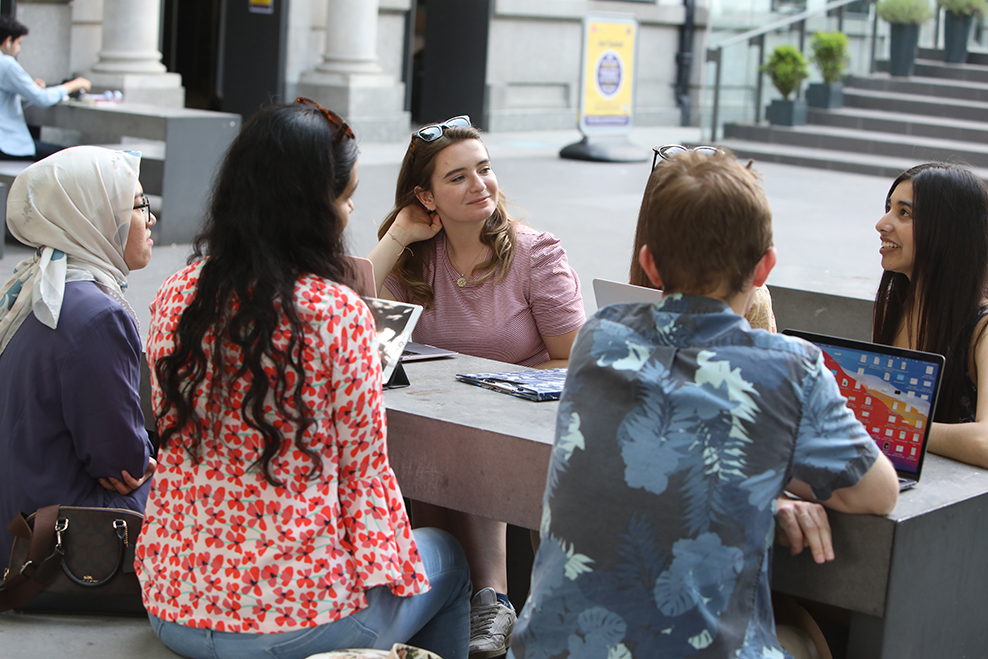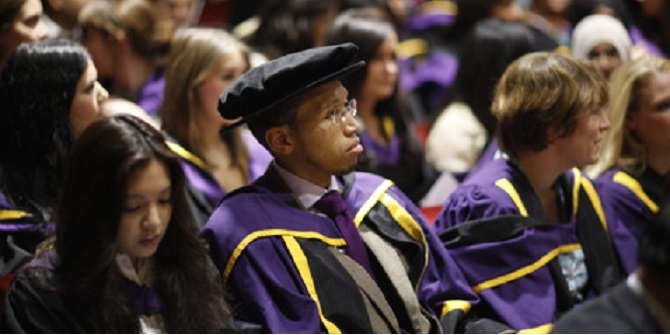During LSE Careers’ Lent Term session all about academic interviews, Assistant Professor Dr Aiko Holvikivi spoke about her experiences of academic job selection and shared her advice on preparing for interviews. She studied at LSE between 2015 and 2019 and defended her thesis in the Department of Gender Studies in November 2019. She has also been employed at LSE as a GTA, a guest teacher, and an ESRC Postdoctoral Fellow.
Aiko’s trajectory may sound smooth when you read it summarised above, but she started the talk by acknowledging that her post-PhD years were a time of precarious progression. Zero-hour contracts in three different places, at LSE as a Research Officer and as a guest teacher, then the following year with the ESRC postdoctoral fellowship, preceded Aiko’s appointment as an Assistant Professor of Gender, Peace and Security. During this time, she applied for over 30 jobs, mainly for permanent positions. Out of these dozens of applications, she was invited to interview three times. Aiko noted that she wanted to share that behind the ‘success’ framing of this talk were numerous rejections – so if/when you receive a rejection, don’t take it as a personal failure, but rather a very common experience in the job market!
So, let’s imagine you have been invited to interview. Congratulations – this is an achievement in and of itself! But what next?
1) Understand the interview process
Firstly, make sure you know the components of the interview process because there are many different things that you might be asked to do. These include:
- a panel interview with the selection committee where they ask the questions;
- a presentation or job talk, followed by questions;
- a teaching demonstration;
- and in North America campus visits are common. You’ll be brought in for a day or two, showed around, expected to have lunch or dinner with faculty and one-to-one meetings with various different people.
As soon as possible, find out exactly what is involved and who will be on your interview panel or at the presentation. This gives you a sense of their subject knowledge and how large an audience to expect. If you’re not told who will be present in your invitation, you should ask. It’s common that different people might be present at different points, so don’t assume, for example, that everyone in your interview will have seen your presentation.
2) Do your research
Next, research the department and the university you’re interviewing for. You can find lots of useful information on publicly available websites, and it’s always a good idea to reach out to people in your network. You can get a sense of what people in the department work on, and this is helpful for two reasons. First, an awareness of the faculty’s research and teaching interests will help give you a sense of what they’re likely to pick up on in your job talk and interview, as well as where they are coming from when they ask you questions. Second, you can show how your work complements and builds on expertise that’s already present.
If the role involves teaching, you will want to get a sense of the current teaching provision and what the department wants to grow. You’ll want to know how many students, what kinds of student, and what kinds of courses they offer.
Then, it’s also important to research the university and be prepared to say how you feel about living and working there. Aiko learned the hard way not to underestimate the importance of this: in one interview she was asked for her thoughts on the university’s restructuring and strategic vision. It brought home the point that if a topic is important to them, you should be ready to engage with it.
3) Prepare responses to predictable questions
In addition to researching the department and university, you’ll want to prepare responses to predictable questions – Aiko used the list produced by LSE Careers.
Thinking through your answers, consider what the selection committee actually wants to know when they’re asking you a question. For example, when the hiring committee asks you to tell them about your research, they don’t want a long and detailed account of what you’ve done in your career. They actually want to know how your research fits in with the department and how your expertise supports the teaching they need. The question ‘tell us about your research’ actually means less about your past research and more about what you will do here. The same goes for teaching and other activities: prepare to talk about your future as much as your previous experience. They want to recruit a new colleague; they will be trying to envision working with you. So, as Karen Kelsky puts it: the question is not the question!
4) Observe talks where you can
For preparing your job talks, please take the opportunity to observe talks or selection processes in your department: it’s a great way to learn! Ask, if you are not able to do this already, it’s an important part of your professional development.
The job talk demonstrates your professional behaviour so prepare to do exactly what is asked and stick to time precisely. This is not the time to be a diva! In the invitation, guidance will be given on what the talk should cover, how long it will last, who will be invited to attend, whether slides are required or encouraged or not.
Aiko prepared her talk to meet the guidance given and used her understanding of the job description to shape her presentation. She constrained her urge to talk at length about her research work but outlined key questions, methods and contribution, using language familiar to the audience, dividing up the time allocated proportionally. In some disciplines, findings and results might be relevant too. Then she mentioned publications and planned publications, public engagement and funding, both present experience and future plans. The panel are thinking about the future, so show how you can continue to contribute specific research and teaching relevant to their needs. Aiko prepared a two page course proposal including a summary of the course, learning outcomes, assessment and an indicative reading list. Practise delivering the talk and give it to as many friends and colleagues as possible, and prepare collegial answers to their questions. The more you practice, the better you get, and this takes time.
5) Sit with the nerves
Aiko avoided saying ‘don’t be nervous’ – you will be! You cannot prepare yourself out of being nervous. Everyone involved knows that this is a stressful situation, and so nerves are understandable. They may even be interpreted positively, as an indication of how much you want the job.
Afterwards, when you have recovered, be sure to make notes about the experience: what questions were asked, what you would do differently next time. You can learn from this, and you might be asked to give a talk like this one in the future…
Thank you to Aiko for sharing her experience, expertise, and enthusiasm for academic life.
Remember: You can get careers support for LSE Careers for up to five years after you graduate. Visit the LSE Careers website to find out more.





